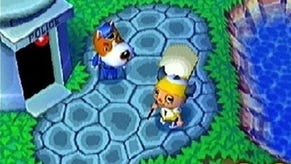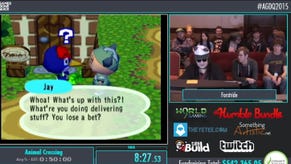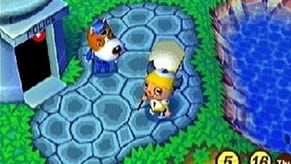Animal Crossing
Better late than never, but is it worth dusting off the Cube to play it?
Order yours now from Simply Games.
Nintendo has a long and inglorious history of making us long suffering PAL gamers wait for its games. How long do you think is enough before enraged gamers storm the Kyoto gates of Big N HQ in their thousands dressed in fluffy animal costumes with giant heads to make their protests? A couple of months for localisation? Four months? A year? Try two years, plus a bit more to take into account its original Japanese release. Yes, dear patient gamer, on September 16th 2002, US gamers were busy running their first errands for Nook and co, while we sat largely oblivious to the cutesy charms of this Most Wanted of Cube releases.
Of course, the belated, nigh on legendary release of Datel's wonderful FreeLoader gave thousands of PAL gamers just the excuse they needed to import it (although naughty Ninty put a stop to the likes of CEX actually selling any imported Nintendo products, threatening the store with legal action after it foolishly decided to sell modded Cubes with a region switch) and by February last year, a wealth of European gamers were becoming ensconced in one of the most bewilderingly held back games of all time. More bizarrely still, Nintendo did produce a PAL version for the Australian market about a year ago, and still couldn't explain why the game wasn't being released in Europe, apart from muttering about the usual localisation issue. By the turn of this year, most of us had simply given up all hope of ever seeing the game on European shelves, and then at E3 it snuck an unheralded press release into its press pack detailing its PAL release, almost, you might suspect, to check if we were still awake. How and why do such bizarre decisions get made? Who forced the issue? We'll probably never know.
No more Mr Nice Mole
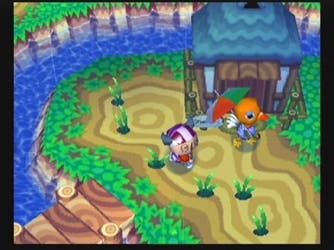
Anyway, with such a determined outcry proving to be ultimately successful, we sit writing our equally long-overdue review with the game having entered the full price UK games chart at No.14 just hours earlier. It's hardly going to have Nintendo execs eating their words, but it feels comparable to the small feeling of victory we once had when seeing a Smiths single enter the hit parade in the Top Twenty and then watching Radio One jocks greet Johnny Marr's floppy fringe and the wave of Morrissey's gladioli with a certain amount of bewilderment. Rubbing shoulders with the current best sellers will be an all-too-brief experience, but in a cultish way it feels like a breath of fresh air.
But, such is the cult of Animal Crossing among the readers of this publication, it's often hard for the uninitiated to work out what all the fuss is about. It's a cutesy fetch and carry game, right? A kleptomania-fetishist's wet dream where you catch a train to the town of your choice, move into a tiny house, work your arse off to pay off your mortgage, spruce up your pad and make as many chums as you can along the way via your position as skivvy for hire. At first, you're at the mercy of Nook, the town's entrepreneur, shop owner and property owner, but after a brief stint as his lacky you're forced to find other means to raise the funds (Bells) you need in your quest to become upwardly mobile.
On a basic level it's an unbelievably simple game, with some astoundingly simple goals. Ultimately, like any independent soul seeking a new life in a dream town, you need cash to do anything, and for cash there are a variety of ways and means. The principal way is simply to talk to people, find out whether they have a job for you, and then go out and perform a relentless succession of menial tasks for them for some sort of reward. Aside from that you can shake trees (because money grows on some of them, stoopid), go insect hunting, dig up fossils, fish, or even try your hand as a fashion guru, designing clothes and umbrella patterns for the populace to sport in their daily routines of, um, wandering around near their houses.
What a pain, aiya?
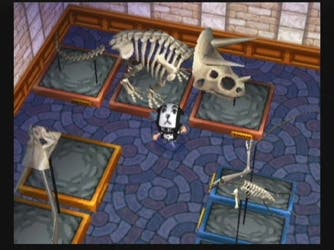
Boiled down to its constituent parts, Animal Crossing sounds utterly pointless and repetitive. Indeed, you can spend hours just literally performing fetch and carry jobs for everyone and offloading your inventory stash whenever required. It might help you make those payments down at the Post Office. But after a while you'll probably start to question your sanity. If this was a Teletubbies-branded educational adventure designed for children as a means of instilling the benefits of positive social interaction we'd believe it, and probably wouldn't go within 40 miles of it. So why does its Nintendo badge seem to make it so appealing to hardcore gamers hung up on Japanese cartoon charm?
For one thing, it's undoubtedly the charm and humour that weaves its spell around you that makes it so infectious. There's no way we'd devote the amount of time it takes to do nothing in this game if it wasn't to see what gem the various characters come out with, aiya? If it's not Choo suffering from one of his legendarily bad moods, it's Rhoda being a terrible flirt and calling us Clucky for the 15th time this hour. Yes, most of what you do in Animal Crossing is pointless and repetitive, and you will spend hours meandering for little more reward than a few thousand bells, but somehow you don't mind. It's like gaming hypnotism. Several times we'd have to check with fellow AC players whether we'd missed something, and it appears up to a point that this most definitely is not a game that can be 'reviewed' in the traditional sense, thanks to its ingenious real time clock and calendar, and ability to swap towns with friends and even (gasp) dust off that link cable and plug in a GBA for some pattern-creation fun, or visit an island (and watch the residents while you're away).
When the game kicks off, you simply set it as whatever the current date and time is, and go from there, but where Animal Crossing keeps players coming back is the desire to 'tune in' and see if anyone new has moved in, whether certain 'visitors' have arrived, not to mention the special events triggered during the holidays relevant to whatever country you happen to live in (spoken of as one of the reasons the US version couldn't just be ported as was). On top of that, there are plenty of objects and articles that take time to uncover, or even order from Nook's catalogue - NES games, anyone? Admittedly, the novelty of playing old 8-bit games within a modern game wears off pretty quickly (Shenmue, anyone?), but as an example of the attention to detail within the package, it's easy to see why so many devotees have had their lives taken over by what is a relatively simple concept. That many have even been moved to buying USB memory cards in order to swap town data and explore each other's creations speaks volumes of the kind of game we're dealing with. For those who've invested the time and effort, it's spoken of with the kind of affection reserved for very few games.
Brilliantly pointless, pointlessly brilliant?
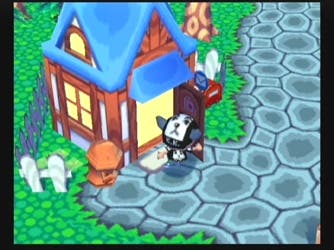
But even as an arch disciple, it's still easy to acknowledge that this isn't a game for everyone. In the same way that the kind of repetition and customisation within The Sims isn't everyone's idea of a fun way to kill a few hours, similar arguments can be levelled at AC. But while the game world freezes over in virtually every other game out there, there's always the incentive to come back and check out how your town is doing, see who's moved in, and to make sure you're up to date on your re-payments - it's the kind of game where playing for only a few minutes here and there can make all the difference. In that sense it's a truly unique and brilliantly pointless experience.
In many senses Animal Crossing is a totally out of time game that stands out among the herd of samey done-to-death titles out there. It's the sort of game that could have been made 15 years ago or more such is its simplicity. That's not to say it's particularly retro though. Sure, the cutesy, basic, brightly coloured graphical styling aren't exactly stretching the Cube, but it's hard not to love them all the same when you've got a big-headed talking panda or sheep burbling away at you in an almost discernible dialect, greeted by variations of the same addictive little ditty.
Playing Animal Crossing feels like the gaming equivalent of watching 70s/early 80s children's TV. Think Bod, think Magic Roundabout, and try not to smile while you're playing. But please god, don't think Teletubbies, unless you're on really good medication. It's charming and childish, yet has that layer of humour sophistication that rescues it from being labelled as a mere curiosity cult. Like we said earlier, you can't really review Animal Crossing, you can merely report back your experiences. It's evidently greater than the sum of its parts, it definitely won't appeal to everyone, but to those that seek a different flavour of gaming the choice is yours. We just wish Ninty had given us that choice a couple of years back, because you can't help but feel its impact has been lessened as a result...





